UK Law Overview: Classifications, Sources, and Employment Law 1996
VerifiedAdded on 2023/06/14
|8
|2608
|499
Report
AI Summary
This report provides a comprehensive overview of the UK legal system, dividing the discussion into three main parts. The first part classifies laws, defining laws within the UK legal system and explaining the differences between civil and criminal law, along with the roles of the High Court and Supreme Court. The second part explores the sources of law, focusing on case law and the legislative process, including delegated legislation. The third part delves into UK employment law, detailing the statutory duties of employers to their employees, and addressing wrongful and unfair dismissal actions. The report concludes by summarizing the importance of commercial law and effective law-making for companies, emphasizing systematic operations and adherence to legal principles. Desklib provides this assignment solution and many more resources for students.
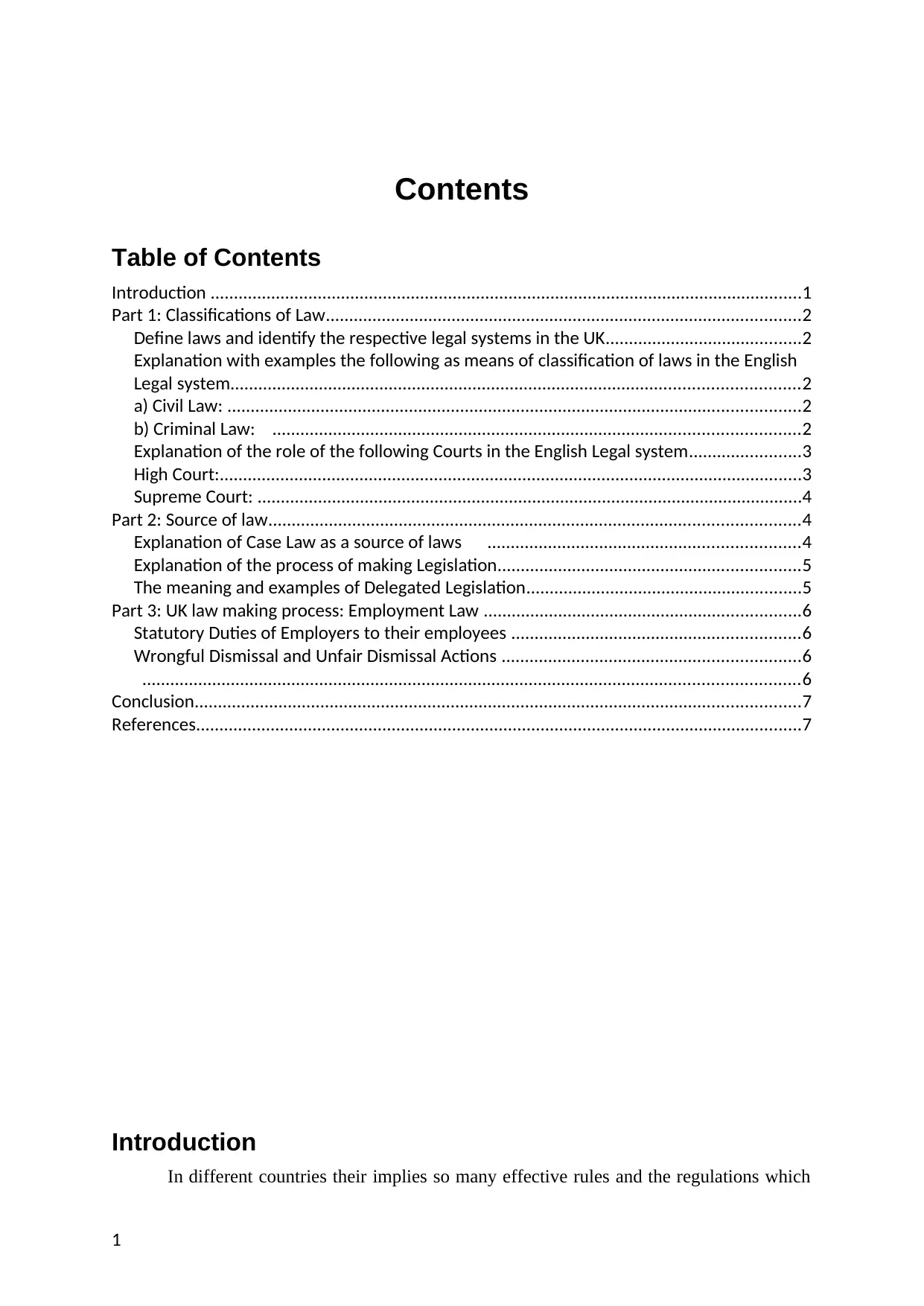
Contents
Table of Contents
Introduction ...............................................................................................................................1
Part 1: Classifications of Law......................................................................................................2
Define laws and identify the respective legal systems in the UK..........................................2
Explanation with examples the following as means of classification of laws in the English
Legal system..........................................................................................................................2
a) Civil Law: ...........................................................................................................................2
b) Criminal Law: .................................................................................................................2
Explanation of the role of the following Courts in the English Legal system........................3
High Court:.............................................................................................................................3
Supreme Court: .....................................................................................................................4
Part 2: Source of law..................................................................................................................4
Explanation of Case Law as a source of laws ...................................................................4
Explanation of the process of making Legislation.................................................................5
The meaning and examples of Delegated Legislation...........................................................5
Part 3: UK law making process: Employment Law ....................................................................6
Statutory Duties of Employers to their employees ..............................................................6
Wrongful Dismissal and Unfair Dismissal Actions ................................................................6
.............................................................................................................................................6
Conclusion..................................................................................................................................7
References..................................................................................................................................7
Introduction
In different countries their implies so many effective rules and the regulations which
1
Table of Contents
Introduction ...............................................................................................................................1
Part 1: Classifications of Law......................................................................................................2
Define laws and identify the respective legal systems in the UK..........................................2
Explanation with examples the following as means of classification of laws in the English
Legal system..........................................................................................................................2
a) Civil Law: ...........................................................................................................................2
b) Criminal Law: .................................................................................................................2
Explanation of the role of the following Courts in the English Legal system........................3
High Court:.............................................................................................................................3
Supreme Court: .....................................................................................................................4
Part 2: Source of law..................................................................................................................4
Explanation of Case Law as a source of laws ...................................................................4
Explanation of the process of making Legislation.................................................................5
The meaning and examples of Delegated Legislation...........................................................5
Part 3: UK law making process: Employment Law ....................................................................6
Statutory Duties of Employers to their employees ..............................................................6
Wrongful Dismissal and Unfair Dismissal Actions ................................................................6
.............................................................................................................................................6
Conclusion..................................................................................................................................7
References..................................................................................................................................7
Introduction
In different countries their implies so many effective rules and the regulations which
1
Paraphrase This Document
Need a fresh take? Get an instant paraphrase of this document with our AI Paraphraser
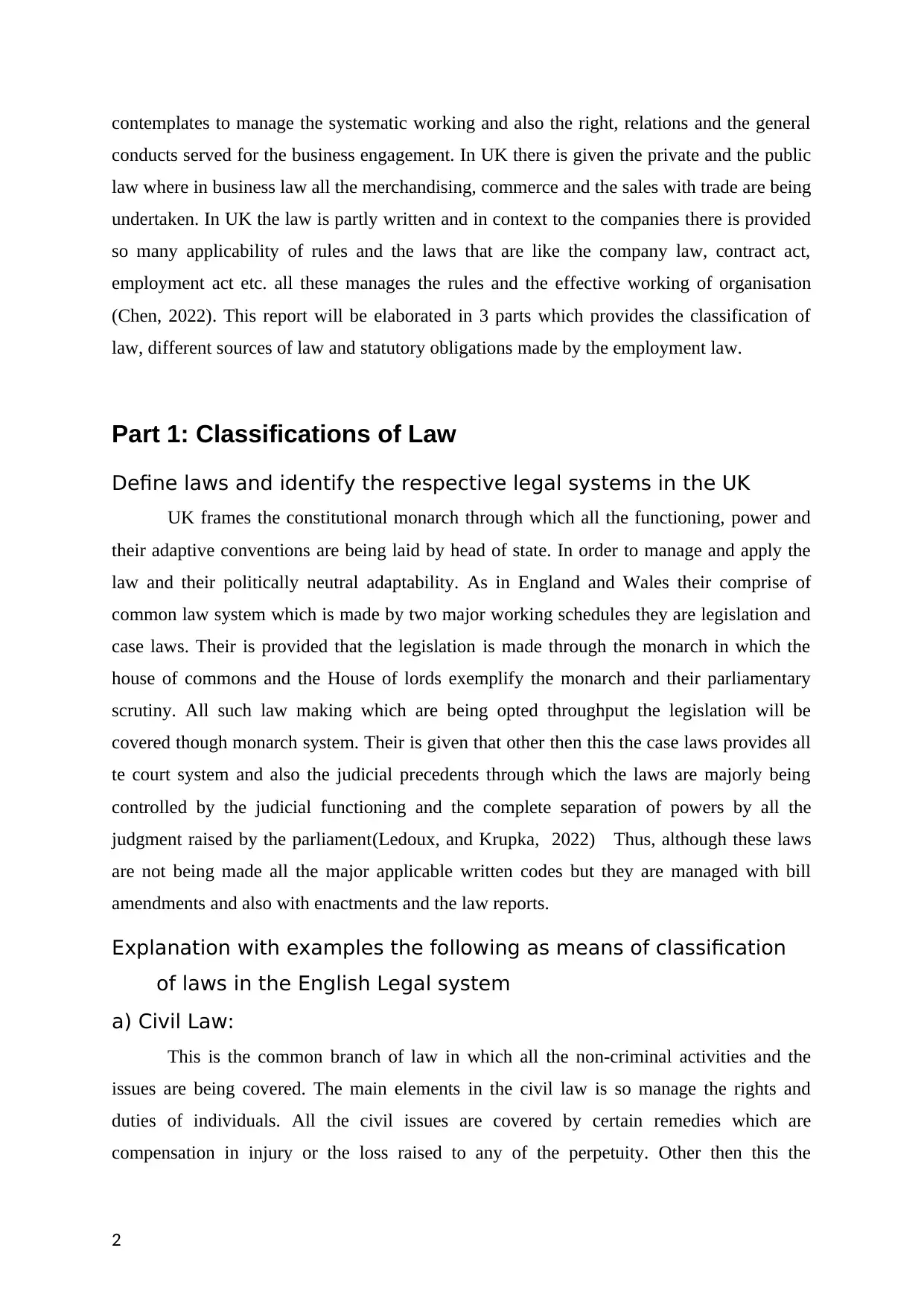
contemplates to manage the systematic working and also the right, relations and the general
conducts served for the business engagement. In UK there is given the private and the public
law where in business law all the merchandising, commerce and the sales with trade are being
undertaken. In UK the law is partly written and in context to the companies there is provided
so many applicability of rules and the laws that are like the company law, contract act,
employment act etc. all these manages the rules and the effective working of organisation
(Chen, 2022). This report will be elaborated in 3 parts which provides the classification of
law, different sources of law and statutory obligations made by the employment law.
Part 1: Classifications of Law
Define laws and identify the respective legal systems in the UK
UK frames the constitutional monarch through which all the functioning, power and
their adaptive conventions are being laid by head of state. In order to manage and apply the
law and their politically neutral adaptability. As in England and Wales their comprise of
common law system which is made by two major working schedules they are legislation and
case laws. Their is provided that the legislation is made through the monarch in which the
house of commons and the House of lords exemplify the monarch and their parliamentary
scrutiny. All such law making which are being opted throughput the legislation will be
covered though monarch system. Their is given that other then this the case laws provides all
te court system and also the judicial precedents through which the laws are majorly being
controlled by the judicial functioning and the complete separation of powers by all the
judgment raised by the parliament(Ledoux, and Krupka, 2022) Thus, although these laws
are not being made all the major applicable written codes but they are managed with bill
amendments and also with enactments and the law reports.
Explanation with examples the following as means of classification
of laws in the English Legal system
a) Civil Law:
This is the common branch of law in which all the non-criminal activities and the
issues are being covered. The main elements in the civil law is so manage the rights and
duties of individuals. All the civil issues are covered by certain remedies which are
compensation in injury or the loss raised to any of the perpetuity. Other then this the
2
conducts served for the business engagement. In UK there is given the private and the public
law where in business law all the merchandising, commerce and the sales with trade are being
undertaken. In UK the law is partly written and in context to the companies there is provided
so many applicability of rules and the laws that are like the company law, contract act,
employment act etc. all these manages the rules and the effective working of organisation
(Chen, 2022). This report will be elaborated in 3 parts which provides the classification of
law, different sources of law and statutory obligations made by the employment law.
Part 1: Classifications of Law
Define laws and identify the respective legal systems in the UK
UK frames the constitutional monarch through which all the functioning, power and
their adaptive conventions are being laid by head of state. In order to manage and apply the
law and their politically neutral adaptability. As in England and Wales their comprise of
common law system which is made by two major working schedules they are legislation and
case laws. Their is provided that the legislation is made through the monarch in which the
house of commons and the House of lords exemplify the monarch and their parliamentary
scrutiny. All such law making which are being opted throughput the legislation will be
covered though monarch system. Their is given that other then this the case laws provides all
te court system and also the judicial precedents through which the laws are majorly being
controlled by the judicial functioning and the complete separation of powers by all the
judgment raised by the parliament(Ledoux, and Krupka, 2022) Thus, although these laws
are not being made all the major applicable written codes but they are managed with bill
amendments and also with enactments and the law reports.
Explanation with examples the following as means of classification
of laws in the English Legal system
a) Civil Law:
This is the common branch of law in which all the non-criminal activities and the
issues are being covered. The main elements in the civil law is so manage the rights and
duties of individuals. All the civil issues are covered by certain remedies which are
compensation in injury or the loss raised to any of the perpetuity. Other then this the
2
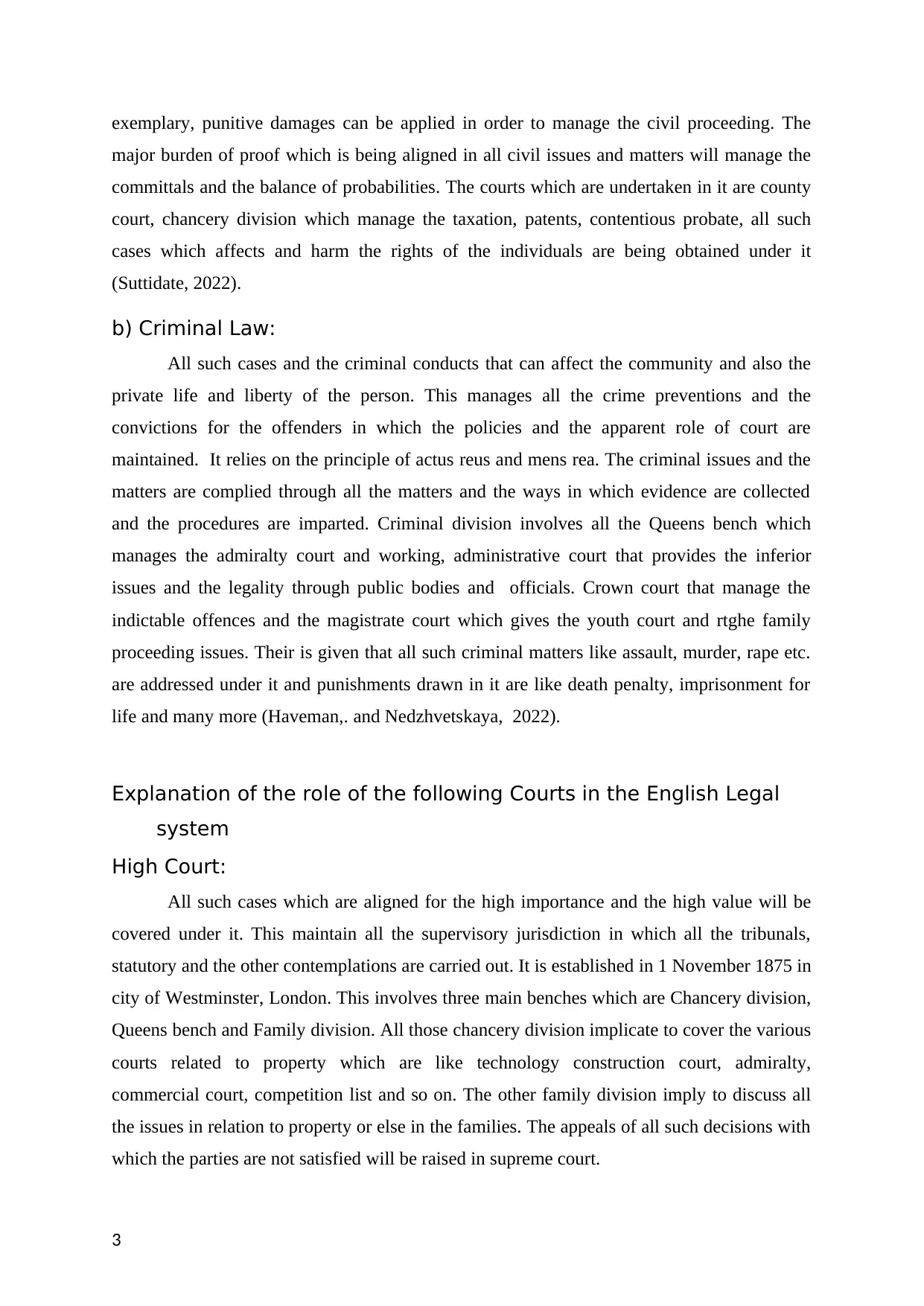
exemplary, punitive damages can be applied in order to manage the civil proceeding. The
major burden of proof which is being aligned in all civil issues and matters will manage the
committals and the balance of probabilities. The courts which are undertaken in it are county
court, chancery division which manage the taxation, patents, contentious probate, all such
cases which affects and harm the rights of the individuals are being obtained under it
(Suttidate, 2022).
b) Criminal Law:
All such cases and the criminal conducts that can affect the community and also the
private life and liberty of the person. This manages all the crime preventions and the
convictions for the offenders in which the policies and the apparent role of court are
maintained. It relies on the principle of actus reus and mens rea. The criminal issues and the
matters are complied through all the matters and the ways in which evidence are collected
and the procedures are imparted. Criminal division involves all the Queens bench which
manages the admiralty court and working, administrative court that provides the inferior
issues and the legality through public bodies and officials. Crown court that manage the
indictable offences and the magistrate court which gives the youth court and rtghe family
proceeding issues. Their is given that all such criminal matters like assault, murder, rape etc.
are addressed under it and punishments drawn in it are like death penalty, imprisonment for
life and many more (Haveman,. and Nedzhvetskaya, 2022).
Explanation of the role of the following Courts in the English Legal
system
High Court:
All such cases which are aligned for the high importance and the high value will be
covered under it. This maintain all the supervisory jurisdiction in which all the tribunals,
statutory and the other contemplations are carried out. It is established in 1 November 1875 in
city of Westminster, London. This involves three main benches which are Chancery division,
Queens bench and Family division. All those chancery division implicate to cover the various
courts related to property which are like technology construction court, admiralty,
commercial court, competition list and so on. The other family division imply to discuss all
the issues in relation to property or else in the families. The appeals of all such decisions with
which the parties are not satisfied will be raised in supreme court.
3
major burden of proof which is being aligned in all civil issues and matters will manage the
committals and the balance of probabilities. The courts which are undertaken in it are county
court, chancery division which manage the taxation, patents, contentious probate, all such
cases which affects and harm the rights of the individuals are being obtained under it
(Suttidate, 2022).
b) Criminal Law:
All such cases and the criminal conducts that can affect the community and also the
private life and liberty of the person. This manages all the crime preventions and the
convictions for the offenders in which the policies and the apparent role of court are
maintained. It relies on the principle of actus reus and mens rea. The criminal issues and the
matters are complied through all the matters and the ways in which evidence are collected
and the procedures are imparted. Criminal division involves all the Queens bench which
manages the admiralty court and working, administrative court that provides the inferior
issues and the legality through public bodies and officials. Crown court that manage the
indictable offences and the magistrate court which gives the youth court and rtghe family
proceeding issues. Their is given that all such criminal matters like assault, murder, rape etc.
are addressed under it and punishments drawn in it are like death penalty, imprisonment for
life and many more (Haveman,. and Nedzhvetskaya, 2022).
Explanation of the role of the following Courts in the English Legal
system
High Court:
All such cases which are aligned for the high importance and the high value will be
covered under it. This maintain all the supervisory jurisdiction in which all the tribunals,
statutory and the other contemplations are carried out. It is established in 1 November 1875 in
city of Westminster, London. This involves three main benches which are Chancery division,
Queens bench and Family division. All those chancery division implicate to cover the various
courts related to property which are like technology construction court, admiralty,
commercial court, competition list and so on. The other family division imply to discuss all
the issues in relation to property or else in the families. The appeals of all such decisions with
which the parties are not satisfied will be raised in supreme court.
3
⊘ This is a preview!⊘
Do you want full access?
Subscribe today to unlock all pages.

Trusted by 1+ million students worldwide
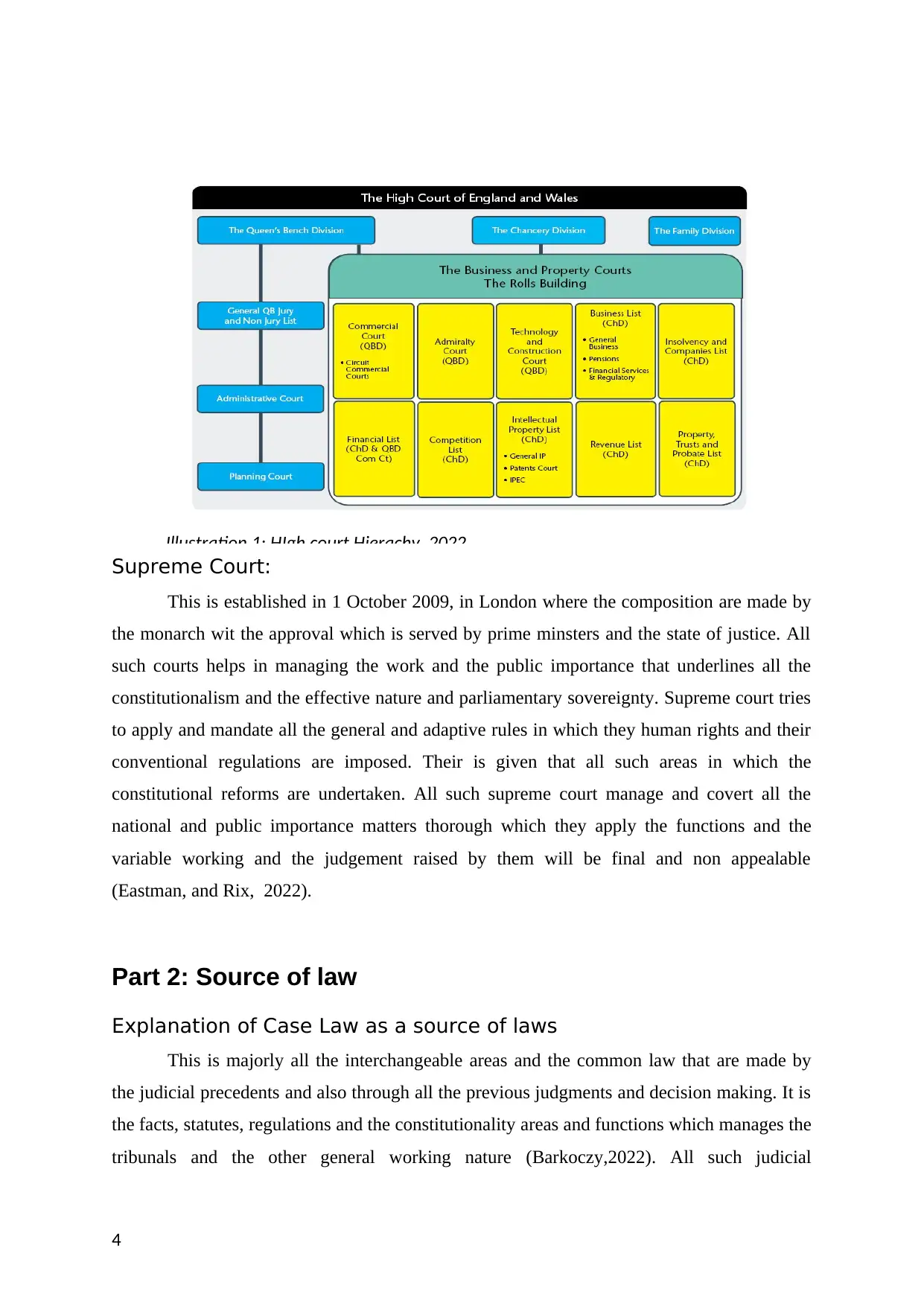
Supreme Court:
This is established in 1 October 2009, in London where the composition are made by
the monarch wit the approval which is served by prime minsters and the state of justice. All
such courts helps in managing the work and the public importance that underlines all the
constitutionalism and the effective nature and parliamentary sovereignty. Supreme court tries
to apply and mandate all the general and adaptive rules in which they human rights and their
conventional regulations are imposed. Their is given that all such areas in which the
constitutional reforms are undertaken. All such supreme court manage and covert all the
national and public importance matters thorough which they apply the functions and the
variable working and the judgement raised by them will be final and non appealable
(Eastman, and Rix, 2022).
Part 2: Source of law
Explanation of Case Law as a source of laws
This is majorly all the interchangeable areas and the common law that are made by
the judicial precedents and also through all the previous judgments and decision making. It is
the facts, statutes, regulations and the constitutionality areas and functions which manages the
tribunals and the other general working nature (Barkoczy,2022). All such judicial
4
Illustration 1: HIgh court Hierachy, 2022
This is established in 1 October 2009, in London where the composition are made by
the monarch wit the approval which is served by prime minsters and the state of justice. All
such courts helps in managing the work and the public importance that underlines all the
constitutionalism and the effective nature and parliamentary sovereignty. Supreme court tries
to apply and mandate all the general and adaptive rules in which they human rights and their
conventional regulations are imposed. Their is given that all such areas in which the
constitutional reforms are undertaken. All such supreme court manage and covert all the
national and public importance matters thorough which they apply the functions and the
variable working and the judgement raised by them will be final and non appealable
(Eastman, and Rix, 2022).
Part 2: Source of law
Explanation of Case Law as a source of laws
This is majorly all the interchangeable areas and the common law that are made by
the judicial precedents and also through all the previous judgments and decision making. It is
the facts, statutes, regulations and the constitutionality areas and functions which manages the
tribunals and the other general working nature (Barkoczy,2022). All such judicial
4
Illustration 1: HIgh court Hierachy, 2022
Paraphrase This Document
Need a fresh take? Get an instant paraphrase of this document with our AI Paraphraser
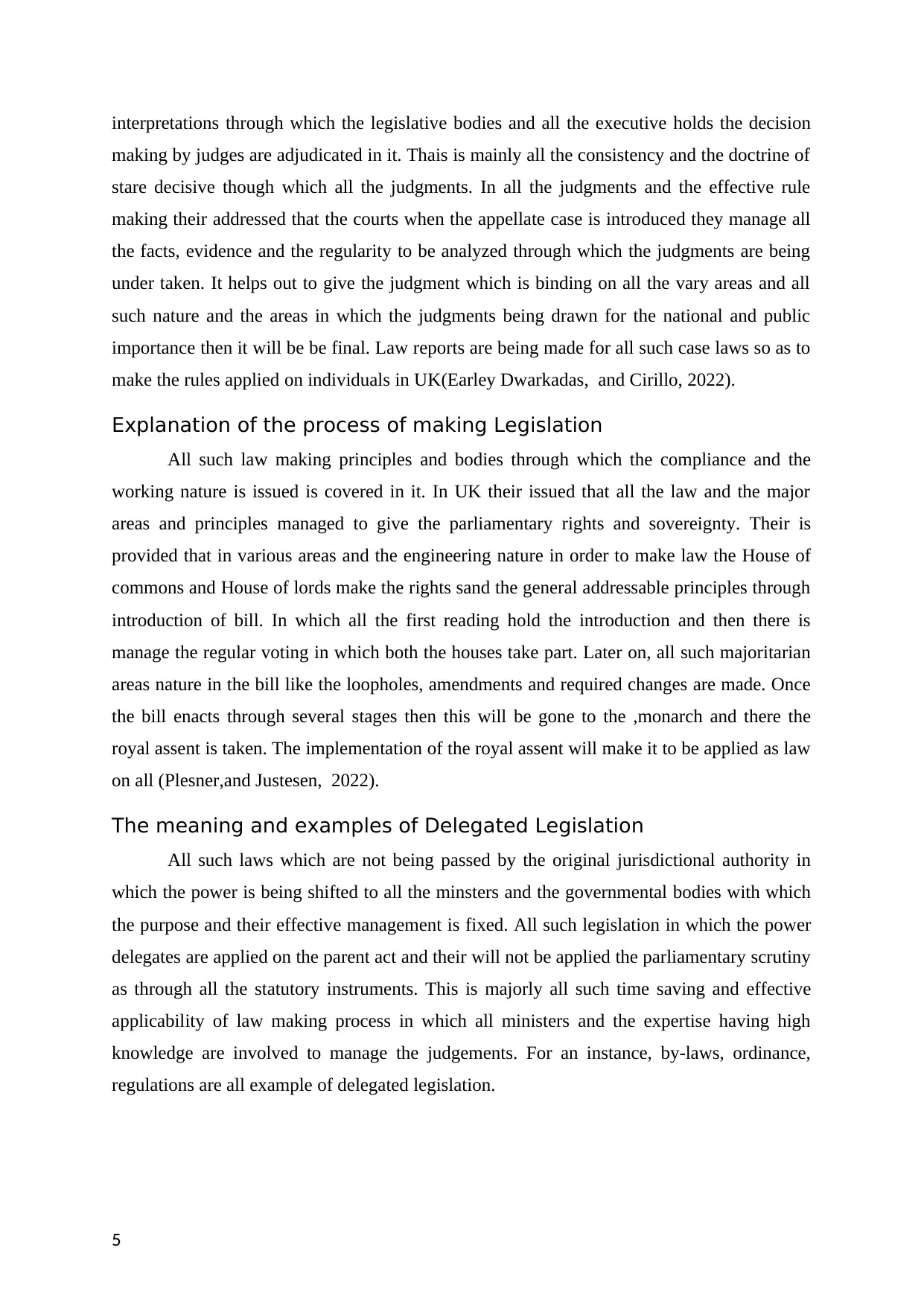
interpretations through which the legislative bodies and all the executive holds the decision
making by judges are adjudicated in it. Thais is mainly all the consistency and the doctrine of
stare decisive though which all the judgments. In all the judgments and the effective rule
making their addressed that the courts when the appellate case is introduced they manage all
the facts, evidence and the regularity to be analyzed through which the judgments are being
under taken. It helps out to give the judgment which is binding on all the vary areas and all
such nature and the areas in which the judgments being drawn for the national and public
importance then it will be be final. Law reports are being made for all such case laws so as to
make the rules applied on individuals in UK(Earley Dwarkadas, and Cirillo, 2022).
Explanation of the process of making Legislation
All such law making principles and bodies through which the compliance and the
working nature is issued is covered in it. In UK their issued that all the law and the major
areas and principles managed to give the parliamentary rights and sovereignty. Their is
provided that in various areas and the engineering nature in order to make law the House of
commons and House of lords make the rights sand the general addressable principles through
introduction of bill. In which all the first reading hold the introduction and then there is
manage the regular voting in which both the houses take part. Later on, all such majoritarian
areas nature in the bill like the loopholes, amendments and required changes are made. Once
the bill enacts through several stages then this will be gone to the ,monarch and there the
royal assent is taken. The implementation of the royal assent will make it to be applied as law
on all (Plesner,and Justesen, 2022).
The meaning and examples of Delegated Legislation
All such laws which are not being passed by the original jurisdictional authority in
which the power is being shifted to all the minsters and the governmental bodies with which
the purpose and their effective management is fixed. All such legislation in which the power
delegates are applied on the parent act and their will not be applied the parliamentary scrutiny
as through all the statutory instruments. This is majorly all such time saving and effective
applicability of law making process in which all ministers and the expertise having high
knowledge are involved to manage the judgements. For an instance, by-laws, ordinance,
regulations are all example of delegated legislation.
5
making by judges are adjudicated in it. Thais is mainly all the consistency and the doctrine of
stare decisive though which all the judgments. In all the judgments and the effective rule
making their addressed that the courts when the appellate case is introduced they manage all
the facts, evidence and the regularity to be analyzed through which the judgments are being
under taken. It helps out to give the judgment which is binding on all the vary areas and all
such nature and the areas in which the judgments being drawn for the national and public
importance then it will be be final. Law reports are being made for all such case laws so as to
make the rules applied on individuals in UK(Earley Dwarkadas, and Cirillo, 2022).
Explanation of the process of making Legislation
All such law making principles and bodies through which the compliance and the
working nature is issued is covered in it. In UK their issued that all the law and the major
areas and principles managed to give the parliamentary rights and sovereignty. Their is
provided that in various areas and the engineering nature in order to make law the House of
commons and House of lords make the rights sand the general addressable principles through
introduction of bill. In which all the first reading hold the introduction and then there is
manage the regular voting in which both the houses take part. Later on, all such majoritarian
areas nature in the bill like the loopholes, amendments and required changes are made. Once
the bill enacts through several stages then this will be gone to the ,monarch and there the
royal assent is taken. The implementation of the royal assent will make it to be applied as law
on all (Plesner,and Justesen, 2022).
The meaning and examples of Delegated Legislation
All such laws which are not being passed by the original jurisdictional authority in
which the power is being shifted to all the minsters and the governmental bodies with which
the purpose and their effective management is fixed. All such legislation in which the power
delegates are applied on the parent act and their will not be applied the parliamentary scrutiny
as through all the statutory instruments. This is majorly all such time saving and effective
applicability of law making process in which all ministers and the expertise having high
knowledge are involved to manage the judgements. For an instance, by-laws, ordinance,
regulations are all example of delegated legislation.
5
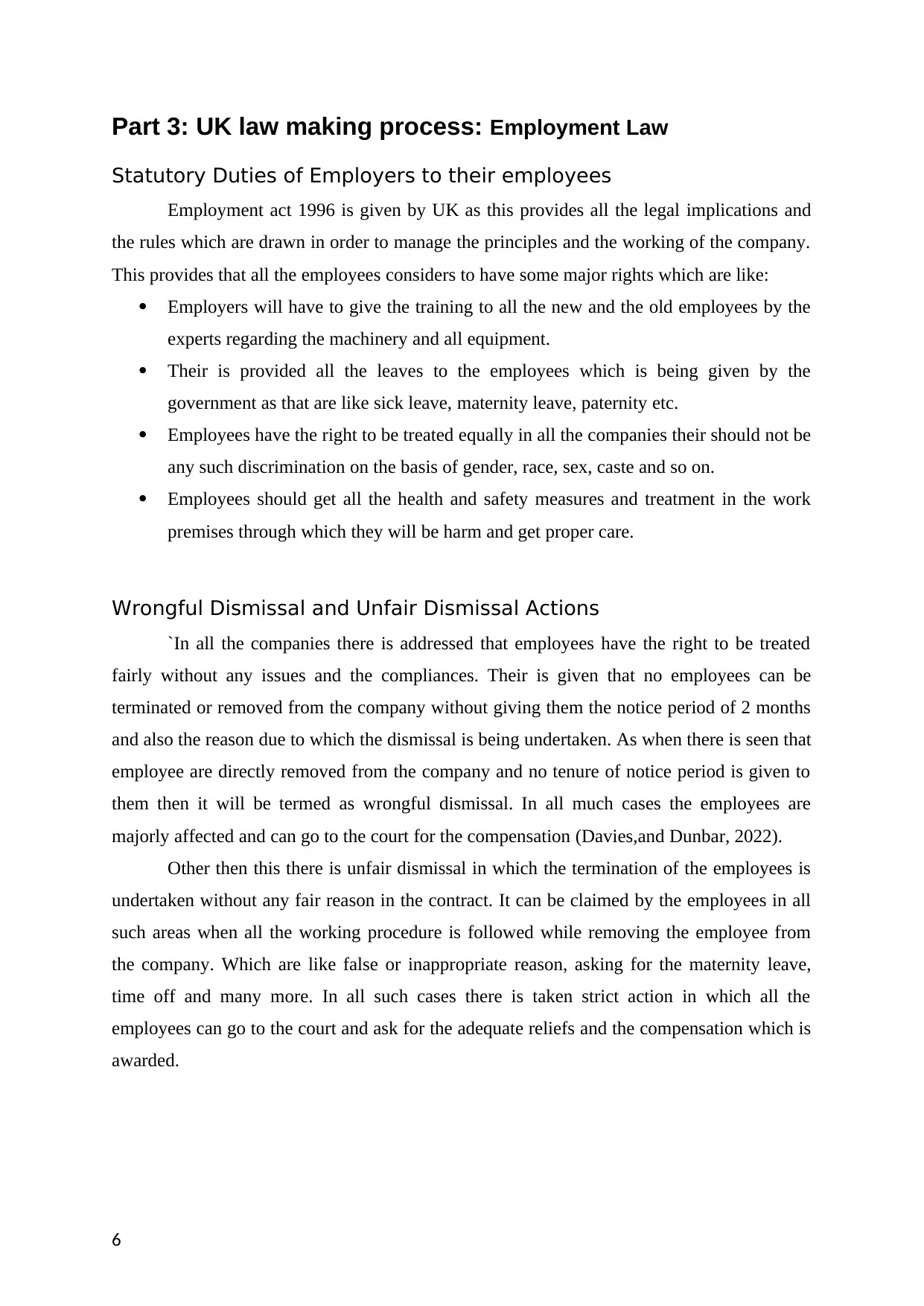
Part 3: UK law making process: Employment Law
Statutory Duties of Employers to their employees
Employment act 1996 is given by UK as this provides all the legal implications and
the rules which are drawn in order to manage the principles and the working of the company.
This provides that all the employees considers to have some major rights which are like:
Employers will have to give the training to all the new and the old employees by the
experts regarding the machinery and all equipment.
Their is provided all the leaves to the employees which is being given by the
government as that are like sick leave, maternity leave, paternity etc.
Employees have the right to be treated equally in all the companies their should not be
any such discrimination on the basis of gender, race, sex, caste and so on.
Employees should get all the health and safety measures and treatment in the work
premises through which they will be harm and get proper care.
Wrongful Dismissal and Unfair Dismissal Actions
`In all the companies there is addressed that employees have the right to be treated
fairly without any issues and the compliances. Their is given that no employees can be
terminated or removed from the company without giving them the notice period of 2 months
and also the reason due to which the dismissal is being undertaken. As when there is seen that
employee are directly removed from the company and no tenure of notice period is given to
them then it will be termed as wrongful dismissal. In all much cases the employees are
majorly affected and can go to the court for the compensation (Davies,and Dunbar, 2022).
Other then this there is unfair dismissal in which the termination of the employees is
undertaken without any fair reason in the contract. It can be claimed by the employees in all
such areas when all the working procedure is followed while removing the employee from
the company. Which are like false or inappropriate reason, asking for the maternity leave,
time off and many more. In all such cases there is taken strict action in which all the
employees can go to the court and ask for the adequate reliefs and the compensation which is
awarded.
6
Statutory Duties of Employers to their employees
Employment act 1996 is given by UK as this provides all the legal implications and
the rules which are drawn in order to manage the principles and the working of the company.
This provides that all the employees considers to have some major rights which are like:
Employers will have to give the training to all the new and the old employees by the
experts regarding the machinery and all equipment.
Their is provided all the leaves to the employees which is being given by the
government as that are like sick leave, maternity leave, paternity etc.
Employees have the right to be treated equally in all the companies their should not be
any such discrimination on the basis of gender, race, sex, caste and so on.
Employees should get all the health and safety measures and treatment in the work
premises through which they will be harm and get proper care.
Wrongful Dismissal and Unfair Dismissal Actions
`In all the companies there is addressed that employees have the right to be treated
fairly without any issues and the compliances. Their is given that no employees can be
terminated or removed from the company without giving them the notice period of 2 months
and also the reason due to which the dismissal is being undertaken. As when there is seen that
employee are directly removed from the company and no tenure of notice period is given to
them then it will be termed as wrongful dismissal. In all much cases the employees are
majorly affected and can go to the court for the compensation (Davies,and Dunbar, 2022).
Other then this there is unfair dismissal in which the termination of the employees is
undertaken without any fair reason in the contract. It can be claimed by the employees in all
such areas when all the working procedure is followed while removing the employee from
the company. Which are like false or inappropriate reason, asking for the maternity leave,
time off and many more. In all such cases there is taken strict action in which all the
employees can go to the court and ask for the adequate reliefs and the compensation which is
awarded.
6
⊘ This is a preview!⊘
Do you want full access?
Subscribe today to unlock all pages.

Trusted by 1+ million students worldwide
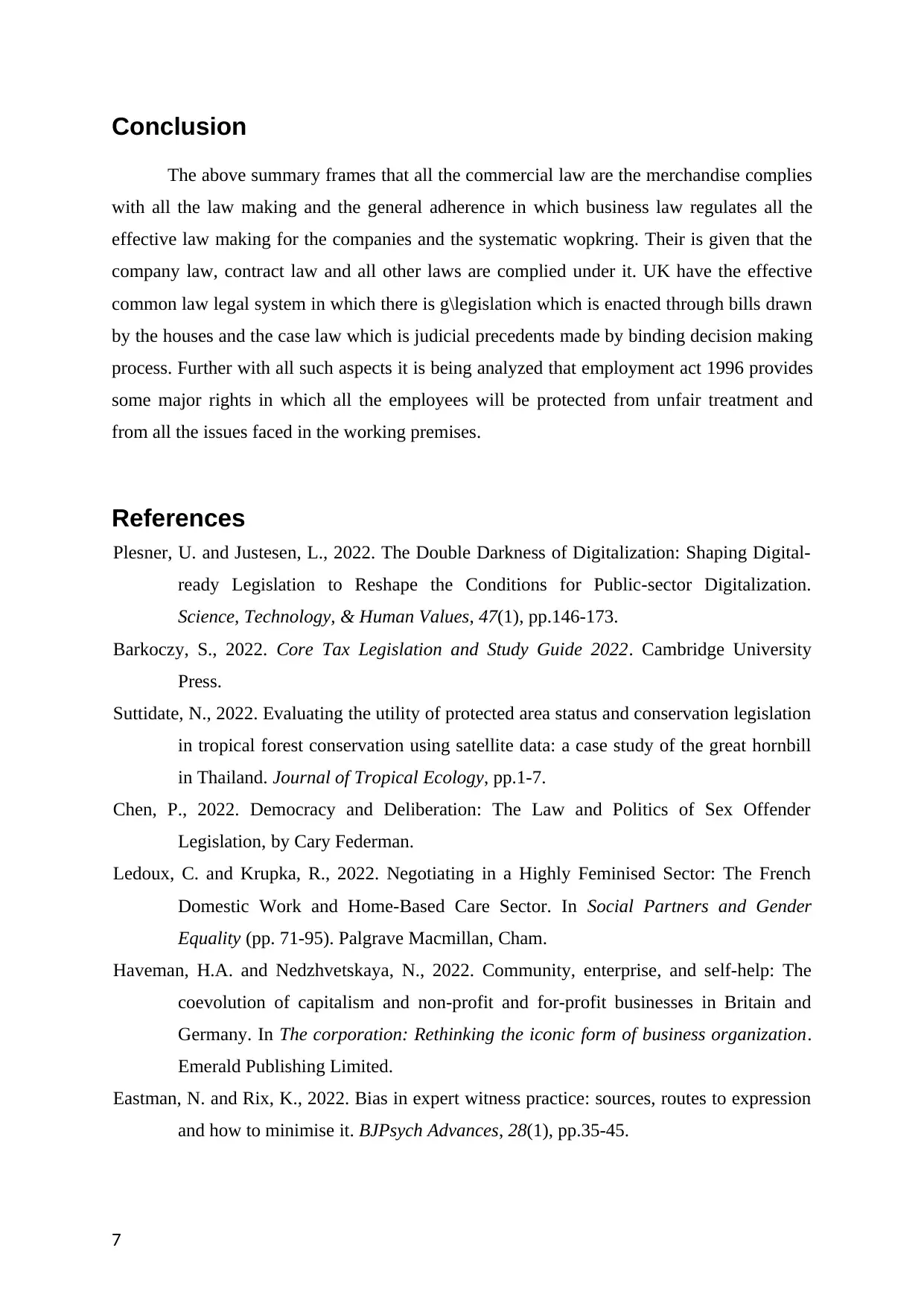
Conclusion
The above summary frames that all the commercial law are the merchandise complies
with all the law making and the general adherence in which business law regulates all the
effective law making for the companies and the systematic wopkring. Their is given that the
company law, contract law and all other laws are complied under it. UK have the effective
common law legal system in which there is g\legislation which is enacted through bills drawn
by the houses and the case law which is judicial precedents made by binding decision making
process. Further with all such aspects it is being analyzed that employment act 1996 provides
some major rights in which all the employees will be protected from unfair treatment and
from all the issues faced in the working premises.
References
Plesner, U. and Justesen, L., 2022. The Double Darkness of Digitalization: Shaping Digital-
ready Legislation to Reshape the Conditions for Public-sector Digitalization.
Science, Technology, & Human Values, 47(1), pp.146-173.
Barkoczy, S., 2022. Core Tax Legislation and Study Guide 2022. Cambridge University
Press.
Suttidate, N., 2022. Evaluating the utility of protected area status and conservation legislation
in tropical forest conservation using satellite data: a case study of the great hornbill
in Thailand. Journal of Tropical Ecology, pp.1-7.
Chen, P., 2022. Democracy and Deliberation: The Law and Politics of Sex Offender
Legislation, by Cary Federman.
Ledoux, C. and Krupka, R., 2022. Negotiating in a Highly Feminised Sector: The French
Domestic Work and Home-Based Care Sector. In Social Partners and Gender
Equality (pp. 71-95). Palgrave Macmillan, Cham.
Haveman, H.A. and Nedzhvetskaya, N., 2022. Community, enterprise, and self-help: The
coevolution of capitalism and non-profit and for-profit businesses in Britain and
Germany. In The corporation: Rethinking the iconic form of business organization.
Emerald Publishing Limited.
Eastman, N. and Rix, K., 2022. Bias in expert witness practice: sources, routes to expression
and how to minimise it. BJPsych Advances, 28(1), pp.35-45.
7
The above summary frames that all the commercial law are the merchandise complies
with all the law making and the general adherence in which business law regulates all the
effective law making for the companies and the systematic wopkring. Their is given that the
company law, contract law and all other laws are complied under it. UK have the effective
common law legal system in which there is g\legislation which is enacted through bills drawn
by the houses and the case law which is judicial precedents made by binding decision making
process. Further with all such aspects it is being analyzed that employment act 1996 provides
some major rights in which all the employees will be protected from unfair treatment and
from all the issues faced in the working premises.
References
Plesner, U. and Justesen, L., 2022. The Double Darkness of Digitalization: Shaping Digital-
ready Legislation to Reshape the Conditions for Public-sector Digitalization.
Science, Technology, & Human Values, 47(1), pp.146-173.
Barkoczy, S., 2022. Core Tax Legislation and Study Guide 2022. Cambridge University
Press.
Suttidate, N., 2022. Evaluating the utility of protected area status and conservation legislation
in tropical forest conservation using satellite data: a case study of the great hornbill
in Thailand. Journal of Tropical Ecology, pp.1-7.
Chen, P., 2022. Democracy and Deliberation: The Law and Politics of Sex Offender
Legislation, by Cary Federman.
Ledoux, C. and Krupka, R., 2022. Negotiating in a Highly Feminised Sector: The French
Domestic Work and Home-Based Care Sector. In Social Partners and Gender
Equality (pp. 71-95). Palgrave Macmillan, Cham.
Haveman, H.A. and Nedzhvetskaya, N., 2022. Community, enterprise, and self-help: The
coevolution of capitalism and non-profit and for-profit businesses in Britain and
Germany. In The corporation: Rethinking the iconic form of business organization.
Emerald Publishing Limited.
Eastman, N. and Rix, K., 2022. Bias in expert witness practice: sources, routes to expression
and how to minimise it. BJPsych Advances, 28(1), pp.35-45.
7
Paraphrase This Document
Need a fresh take? Get an instant paraphrase of this document with our AI Paraphraser

Earley, N.M., Dwarkadas, V.V. and Cirillo, V., 2022. A Long-term Study of Ultraluminous
X-ray Sources in NGC 891. Universe, 8(1), p.18.
Davies, C. and Dunbar, N., 2022. European football and the Covid-19 pandemic–it's impact
on competitions, clubs and player contracts. Malaysian Journal of Sport Science and
Recreation.
8
X-ray Sources in NGC 891. Universe, 8(1), p.18.
Davies, C. and Dunbar, N., 2022. European football and the Covid-19 pandemic–it's impact
on competitions, clubs and player contracts. Malaysian Journal of Sport Science and
Recreation.
8
1 out of 8
Related Documents
Your All-in-One AI-Powered Toolkit for Academic Success.
+13062052269
info@desklib.com
Available 24*7 on WhatsApp / Email
![[object Object]](/_next/static/media/star-bottom.7253800d.svg)
Unlock your academic potential
Copyright © 2020–2026 A2Z Services. All Rights Reserved. Developed and managed by ZUCOL.


